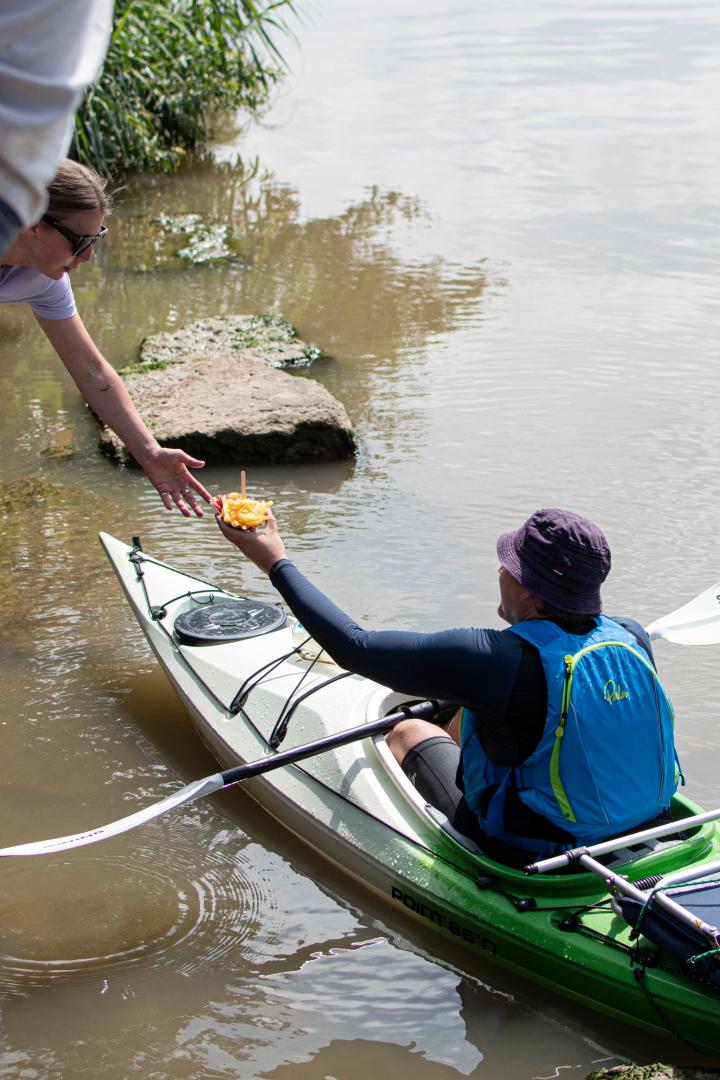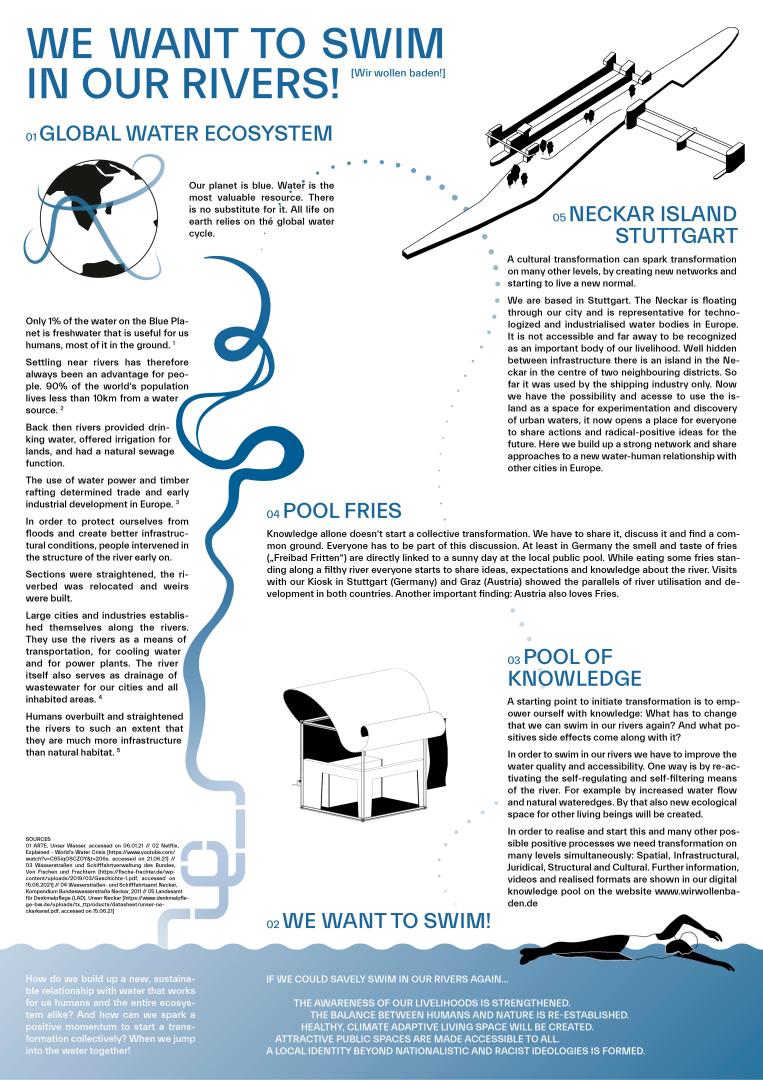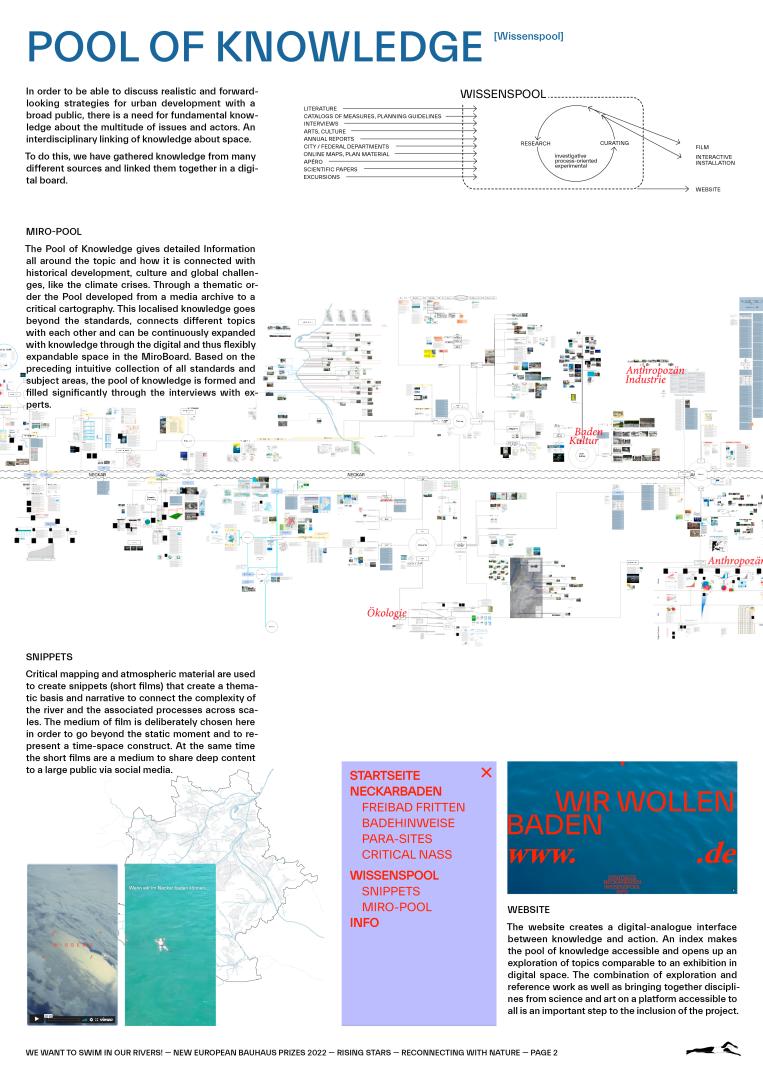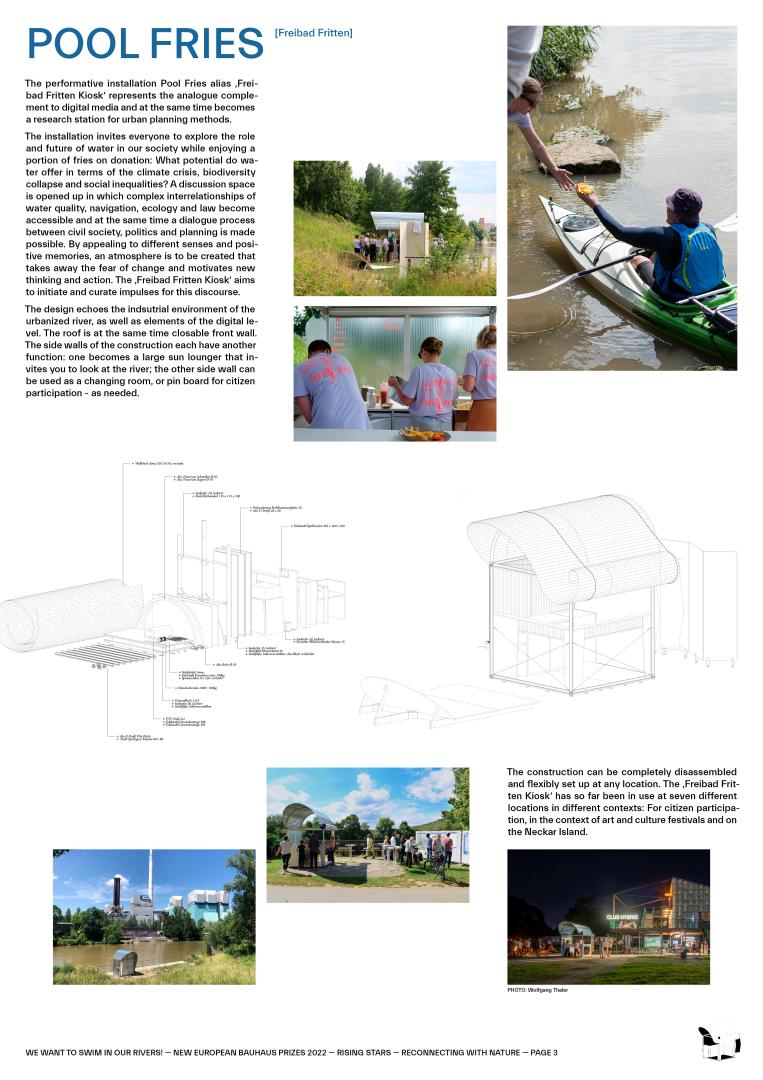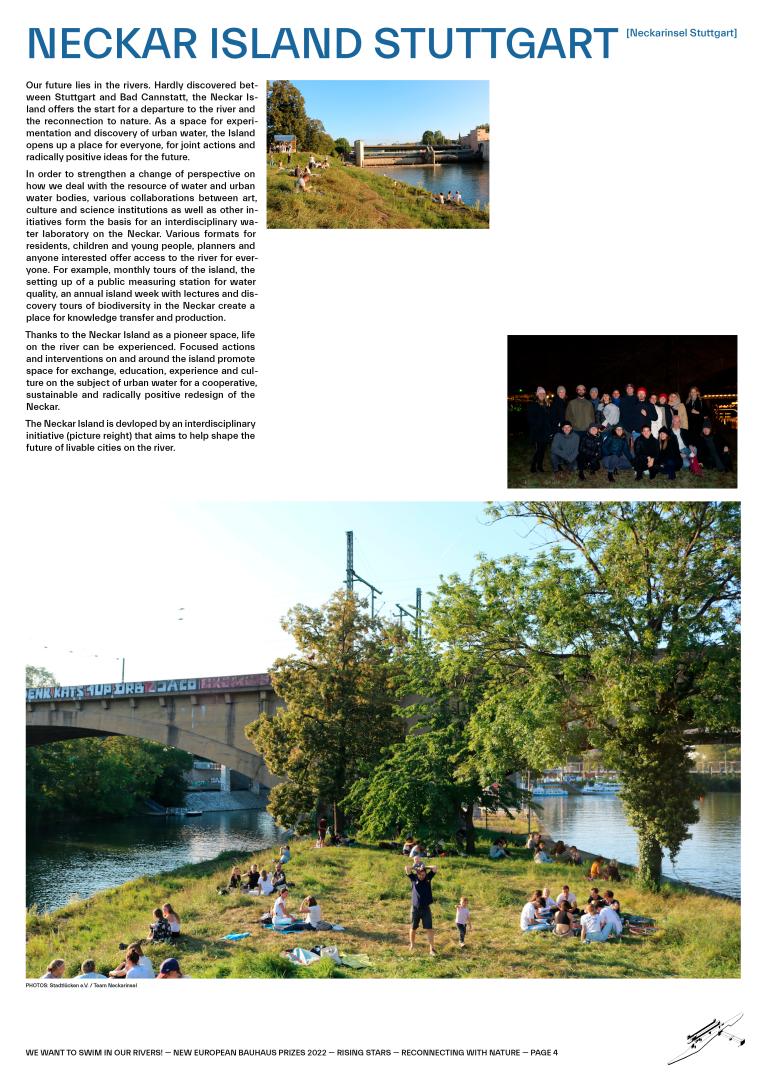We want to swim in our rivers!
Basic information
Project Title
Category
Project Description
“We want to swim in our rivers!” - is our approach to positively transform within the dynamics of complex ecosystems. The awareness of water as a resource of life, as a balance between human and nature, gives this claim of swimming a huge potential for rethinking. By sharing knowledge and creating spaces for discourse, we strive to build a strong network for collective change.
Geographical Scope
Project Region
Urban or rural issues
Physical or other transformations
EU Programme or fund
Which funds
Description of the project
Summary
How can we as designers actively shape a transformation towards a more sustainable and just world? This question was the starting point of the project “We want to swim in our rivers” - it is our approach to positively transform within the dynamics of complex ecosystems.
The awareness of water as a resource of life, as a balance between human and nature, gives this claim of swimming a huge potential for rethinking. Swimming as a cultural practice and the opening of the river to all can provide a new social discourse and initiate a significant change. In the form of a website with short videos, a performative installation on the river banks and an uncovered Island opening space for experimentation we create spaces in which complex interrelationships of water quality, waterway traffic, ecology and law are accessible to all and at the same time a dialogue process between civil society, politics and planning is made possible. By addressing different senses and positive associations with swimming, the aim is to build an atmosphere that takes away the fear of change and motivates people to think and act in a new way.
The project evolved over time. The “Pool of Knowledge” and the “Freibad Fritten Kiosk” were developed as part of our collective master thesis. The overall project was preceded by various study projects on the topic of water and urban transformations, as well as actions in public space with the non-profit association Stadtlücken in Stuttgart with whom the funding for the Neckar Island was initiated. Together we developed the Island as a project based on the findings of the previous thesis.
Key objectives for sustainability
Water as our basis of life accompanies us every day, but remains predominantly unnoticed in the perception of Western society. The climate crisis as a reaction of this artificial human way of life has a threatening effect on the existing water cycles and requires a fast as well as collective action. However, due to the invisibility of precious freshwater, there is a discrepancy between the value of this resource and the collective awareness of it. In order to bring the role of water back into the consciousness of society, historical and cultural references are used: Bathing and swimming. It embodies a strongly positive narrative characterised by recreation and fun. At the same time, however, it also holds enormous potential for widley socially relevant topics.
Therefore we propose the thesis:
“If we could safely swim in our rivers...
→ the awareness of our livelihoods is strengthened.
→ the balance between humans and nature is re-established.
→ healthy, climate adaptive living space will be created.
→ attractive public spaces are made accessible to all.
→ a local identity beyond nationalistic and racist ideologies is formed.”
Through our design of the performative installation Pool Fries (“Freibad Fritten”) on the river banks and implemented actions on the Neckar Island we reconnect people spatially and emotionally to their local rivers. By confronting and actively involving the civil society in the design process we ensure a sustainable development through their commitment and identification to the water body.
We pursue one main design strategy with small cycles in a short time frame consisting of research from local to global, design development, implementation and evaluation. With this loop we can process our learnings into new sustainable concepts towards our design.
Key objectives for aesthetics and quality
The project is composed of digital and analog elements which interact and complement each other. The underlying objective of the design and aesthetics is to create an atmosphere as a reference to the narrative of swimming. The aim was to design all elements friendly in order to make the topic accessible for everyone as well as irritating that one is stumbling over it and asking oneself questions. Another objective is working with the context and aesthetics of industrialised rivers. We do not want to redesign them fundamentally nor see human made structures and nature as necessarily opposite.
We believe that urban transformation can be obtained with minimal structural effort as e.g. by knowledge transfer. Therefore the graphic design was created in an interdisciplinary process with communication designers. The Pool of Knowledge and the website with embedded videos has a fluid character. The Freibad Fritten Kiosk creates an unexpected and at the same time familiar atmosphere that stimulates reflection and exchange. It activates all senses at the same time. The sizzle of the deep fryer, the familiar smell and taste of the fries, as you know it from the public pool - but in a completely different context, the kiosk and its additional elements open a view to the unseen river. The shape of the kiosk adopts the industrial forms that are typical for an urban river bed. The playful graphic design supports the gesture of inviting everyone. Additionally it creates the linkage between the spatial and digital. The Neckar Island works for itself. Here, water infrastructures can be experienced spatially but also fish herons can be observed. The great contrast between the green island and the urban grey generates an atmosphere that attracts people. Different formats are inviting everyone to experience this space in a new way and to get involved in the discussion of the river's future. Minimal spatial interventions are made to offer basic infrastructure like storage and supply.
Key objectives for inclusion
The project builds upon many pillars of cooperation and activation. Key objective here again, is the topic and underlying narrative of the river and swimming that sparks interest and engagement to get involved into the broad topics of transformation. Based on this, each element of the project tries to include on different levels at the same time aiming for a strong network for the rivers positive development.
With the Pool of Knowledge collected information from different sources of expertise around the river is made accessible to everyone via a website and social media. The communicated information about why swimming is not allowed in the Neckar in Stuttgart, for example, empowers the citizens to demand new laws and structures.
The Freibad Fritten Kiosk aims to invite everyone to talk about these opportunities. To include everyone, Fries are offered on a donation basis, it is vegan food and almost everybody enjoys them. The common reference as a snack at the public pool worked within all contexts the Kiosk was built up. Children and majors were equally interested and actively participated in the discourse.
The Neckar Island provides a central semi-public space accessible by public transport and by bike. Different formats activate the Island and invite different stakeholders and the general public. In example, monthly island tours and discussions are offered to everyone interested. Through workshops and educational formats on the island accompanying the research in cooperation with educational and cultural institutions as well as specific water and ecosystem experts, the discourse on content is actively conducted and made publicly accessible for all ages within the framework of the Neckar Island laboratory.
Physical or other transformations
Innovative character
The connecting element in this multi-layered project is the positive established narrative around the water, bathing and swimming. This narrative should lead to a cooperative and just development of our rivers and water ecosystems. The different levels of digital to analogue, unlocated to located, complex to fun, are created by the project elements and initiate this development. The digital available knowledge builds a basis for discussion and provides information for possible approaches of change towards an ecologically sustainable future. The Kiosk is the movable tool to create space for these discussions and opens up an inter-communal exchange. The Island builds a local anchorage for actual change. The aesthetics and atmosphere of these elements support the connecting narrative.

